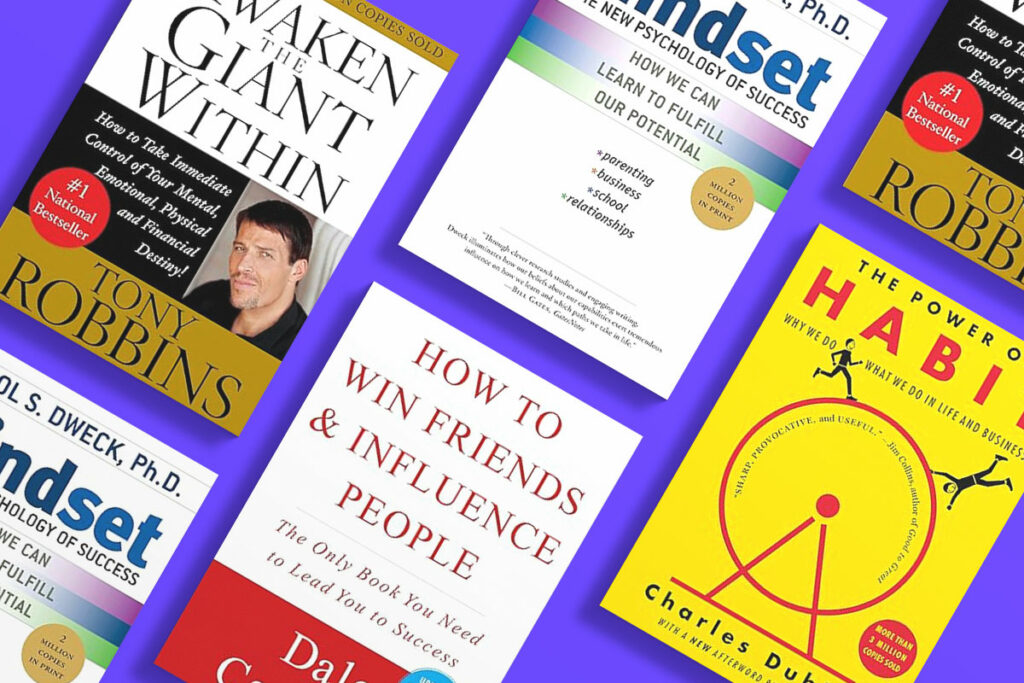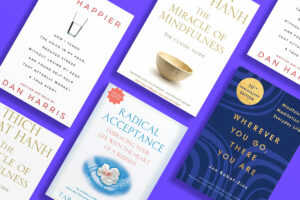
Personal development is a lifelong journey that involves improving various aspects of your life, such as your career, relationships, and overall well-being. Reading books on personal development can provide valuable insights and strategies to help you grow and achieve your goals. Here are the top 10 books for personal development that you should consider adding to your reading list.
1. “Atomic Habits” by James Clear
James Clear’s “Atomic Habits” is a must-read for anyone looking to make significant improvements in their life through small, consistent changes. The book provides a comprehensive guide to habit formation and how tiny changes can lead to remarkable results over time.
Key Concepts:
- The Four Laws of Behavior Change: Make it obvious, make it attractive, make it easy, make it satisfying.
- Habit stacking and the Two-Minute Rule.
- The importance of identity-based habits.
Clear uses scientific research and real-life examples to explain the mechanics of habits and how to effectively build and maintain them. By focusing on small changes, “Atomic Habits” teaches a sustainable approach to personal development.
Why Read This Book:
- Practical and actionable advice.
- Grounded in scientific research.
- Easy-to-understand and implement strategies.
For a concise summary, consider exploring BookBits, which provides key takeaways from “Atomic Habits” and other popular self-help books.
2. “The Power of Habit” by Charles Duhigg
Charles Duhigg’s “The Power of Habit” delves into the science of why habits exist and how they can be changed. The book is divided into three parts: the habits of individuals, the habits of successful organizations, and the habits of societies.
Key Concepts:
- The Habit Loop: Cue, routine, reward.
- Keystone habits that influence other behaviors.
- The role of willpower in habit formation.
Duhigg uses engaging stories and case studies to illustrate how habits shape our lives and how we can use this knowledge to our advantage.
Why Read This Book:
- Comprehensive understanding of habit formation.
- Practical strategies for changing habits.
- Insightful case studies and examples.
3. “Mindset: The New Psychology of Success” by Carol S. Dweck
In “Mindset,” Carol S. Dweck explores the concept of fixed and growth mindsets and how they impact our success in various aspects of life. Dweck’s research shows that individuals with a growth mindset are more likely to achieve their goals and overcome challenges.
Key Concepts:
- Fixed mindset vs. growth mindset.
- The power of believing you can improve.
- How to cultivate a growth mindset.
Dweck provides practical advice on how to shift from a fixed mindset to a growth mindset, which can lead to greater motivation and success.
Why Read This Book:
- Transformative insights on mindset and success.
- Practical strategies for developing a growth mindset.
- Backed by extensive research.
4. “How to Win Friends and Influence People” by Dale Carnegie
Dale Carnegie’s timeless classic, “How to Win Friends and Influence People,” offers valuable lessons on interpersonal skills and effective communication. The book provides practical advice on how to build positive relationships and influence others.
Key Concepts:
- Fundamental techniques in handling people.
- Six ways to make people like you.
- Twelve ways to win people to your way of thinking.
Carnegie’s principles are illustrated with engaging anecdotes and real-life examples, making the book both enjoyable and informative.
Why Read This Book:
- Timeless advice on interpersonal skills.
- Practical and easy-to-implement strategies.
- Engaging and relatable stories.
5. “The 7 Habits of Highly Effective People” by Stephen R. Covey
Stephen R. Covey’s “The 7 Habits of Highly Effective People” is a comprehensive guide to personal and professional effectiveness. Covey outlines seven habits that can help you achieve your goals and lead a more fulfilling life.
Key Concepts:
- The Seven Habits: Be proactive, begin with the end in mind, put first things first, think win-win, seek first to understand, then to be understood, synergize, and sharpen the saw.
- The importance of character ethics over personality ethics.
- The concept of the “Emotional Bank Account.”
Covey’s holistic approach to personal development emphasizes the importance of aligning your actions with your values and principles.
Why Read This Book:
- Comprehensive and holistic approach to personal development.
- Practical strategies for achieving personal and professional goals.
- Emphasis on character development and values.
6. “Awaken the Giant Within” by Tony Robbins
Tony Robbins’ “Awaken the Giant Within” is a motivational guide to taking control of your life and achieving your dreams. Robbins provides strategies for mastering your emotions, finances, relationships, and health.
Key Concepts:
- The power of decision-making.
- The importance of setting and achieving goals.
- Strategies for emotional and financial mastery.
Robbins’ energetic and engaging writing style, combined with his practical advice, makes this book a powerful tool for personal transformation.
Why Read This Book:
- Motivational and inspiring.
- Practical strategies for various aspects of life.
- Energetic and engaging writing style.
7. “The Four Agreements” by Don Miguel Ruiz
In “The Four Agreements,” Don Miguel Ruiz presents a simple yet profound code of conduct based on ancient Toltec wisdom. The book outlines four agreements that can lead to personal freedom and a fulfilling life.
Key Concepts:
- Be impeccable with your word.
- Don’t take anything personally.
- Don’t make assumptions.
- Always do your best.
Ruiz’s teachings encourage readers to break free from self-limiting beliefs and embrace a more authentic and fulfilling life.
Why Read This Book:
- Simple yet profound wisdom.
- Practical and actionable advice.
- Encourages personal freedom and authenticity.
8. “Think and Grow Rich” by Napoleon Hill
Napoleon Hill’s “Think and Grow Rich” is one of the most influential books on personal development and success. Based on Hill’s study of successful individuals, the book outlines principles that can help you achieve financial and personal success.
Key Concepts:
- The power of desire and faith.
- The importance of specialized knowledge.
- The role of persistence and decision-making.
Hill’s principles are timeless and have inspired countless individuals to achieve their goals and dreams.
Why Read This Book:
- Timeless principles of success.
- Practical strategies for achieving financial and personal goals.
- Inspiring and motivational.
9. “Man’s Search for Meaning” by Viktor E. Frankl
Viktor E. Frankl’s “Man’s Search for Meaning” is a powerful memoir and psychological exploration of finding meaning in life. Frankl, a Holocaust survivor, shares his experiences and insights on how to find purpose even in the most challenging circumstances.
Key Concepts:
- The importance of finding meaning and purpose.
- The role of suffering and resilience.
- Logotherapy: A therapeutic approach centered on finding meaning.
Frankl’s profound insights and personal experiences make this book a deeply moving and transformative read.
Why Read This Book:
- Profound and thought-provoking.
- Inspires resilience and finding meaning in life.
- Combines memoir with psychological insights.
10. “The Power of Now” by Eckhart Tolle
Eckhart Tolle’s “The Power of Now” is a spiritual guide to living in the present moment and achieving inner peace. Tolle emphasizes the importance of mindfulness and being present in the here and now.
Key Concepts:
- The importance of living in the present moment.
- The role of the ego and how to transcend it.
- Achieving inner peace and enlightenment.
Tolle’s teachings encourage readers to let go of past regrets and future anxieties, and to embrace the power of now.
Why Read This Book:
- Spiritual and transformative.
- Practical advice on mindfulness and presence.
- Encourages inner peace and enlightenment.
Expanding on Each
To help you dive deeper into each of these remarkable books, let’s expand on some key aspects that make them essential reads for personal development.
“Atomic Habits” by James Clear
James Clear not only provides a roadmap for forming good habits but also delves into the psychology behind why habits form and how they can be modified. One of the most valuable parts of “Atomic Habits” is the emphasis on identity-based habits. Clear explains that focusing on the type of person you want to become rather than the outcome you want to achieve leads to more sustainable habit changes. This approach ensures that your habits are aligned with your values and long-term goals.
Advanced Strategies:
- Habit Stacking: Linking a new habit to an existing one to create a strong trigger.
- Environment Design: Structuring your physical environment to make good habits easier and bad habits harder.
Implementation:
Clear’s advice to start with tiny habits makes the process of habit change less daunting. For instance, if your goal is to start running, begin with just putting on your running shoes and stepping outside. Gradually, this minimal effort turns into a full-blown running routine.
“The Power of Habit” by Charles Duhigg
Charles Duhigg explores the science behind habit formation, emphasizing the Habit Loop, which consists of a cue, routine, and reward. Understanding this loop helps in identifying and altering habits. Duhigg introduces the concept of keystone habits, which are habits that, when changed, can trigger a positive domino effect in other areas of your life.
Advanced Strategies:
- Keystone Habits: Identifying and focusing on habits that have the most significant impact.
- Small Wins: Achieving small victories that lead to a cumulative effect of larger successes.
Implementation:
Duhigg uses real-world examples to show how companies and individuals have transformed their habits to achieve success. For instance, focusing on a keystone habit like exercise can lead to better diet, improved productivity, and reduced stress.
“Mindset: The New Psychology of Success” by Carol S. Dweck
Carol Dweck’s research on fixed and growth mindsets reveals how our beliefs about our abilities can significantly impact our success. A fixed mindset sees abilities as static, while a growth mindset views them as developable.
Advanced Strategies:
- Embracing Challenges: Viewing challenges as opportunities to grow rather than threats.
- Persistence: Encouraging sustained effort and resilience in the face of setbacks.
Implementation:
Dweck provides practical steps for developing a growth mindset, such as praising effort over innate ability and viewing failures as learning experiences. This mindset shift can transform how you approach both personal and professional challenges.
“How to Win Friends and Influence People” by Dale Carnegie
Dale Carnegie’s classic provides timeless advice on improving interpersonal skills. His principles, such as showing genuine interest in others and avoiding criticism, help build strong, positive relationships.
Advanced Strategies:
- Building Rapport: Techniques for establishing and maintaining positive connections.
- Effective Communication: Strategies for influencing others through empathy and understanding.
Implementation:
Carnegie’s principles are illustrated with anecdotes and examples that demonstrate their effectiveness in real-world scenarios. Practicing these techniques can enhance your social and professional interactions, leading to better collaboration and influence.
“The 7 Habits of Highly Effective People” by Stephen R. Covey
Stephen Covey’s book outlines a principle-centered approach to personal and professional effectiveness. The seven habits provide a holistic framework for aligning actions with values.
Advanced Strategies:
- Synergy: Working collaboratively to achieve more significant results than could be accomplished individually.
- Sharpening the Saw: Continuous self-renewal and improvement.
Implementation:
Covey’s emphasis on proactivity and prioritization helps in managing time and focusing on what truly matters. His concept of the “Emotional Bank Account” highlights the importance of trust and respect in relationships.
“Awaken the Giant Within” by Tony Robbins
Tony Robbins’ motivational guide focuses on taking control of your life through effective decision-making and goal setting. His dynamic approach encourages immediate action and sustained momentum.
Advanced Strategies:
- Neuro-Associative Conditioning: Rewiring your brain to associate pain with bad habits and pleasure with good ones.
- Setting SMART Goals: Specific, Measurable, Achievable, Relevant, and Time-bound objectives.
Implementation:
Robbins’ energy and enthusiasm are infectious, inspiring readers to take bold steps towards their dreams. His practical exercises and action plans facilitate immediate application of his strategies.
“The Four Agreements” by Don Miguel Ruiz
Don Miguel Ruiz’s book, based on ancient Toltec wisdom, offers a simple yet profound guide to personal freedom and fulfillment. The four agreements help break self-limiting beliefs and foster a healthier relationship with oneself and others.
Advanced Strategies:
- Living with Integrity: Being impeccable with your word to build trust and self-respect.
- Emotional Independence: Not taking things personally to maintain inner peace.
Implementation:
Ruiz’s agreements are practical and easy to remember, making them effective tools for daily life. Adopting these principles can lead to greater emotional resilience and personal freedom.
“Think and Grow Rich” by Napoleon Hill
Napoleon Hill’s classic on success principles is based on his study of highly successful individuals. The book outlines a systematic approach to achieving financial and personal success through desire, faith, and persistence.
Advanced Strategies:
- Mastermind Groups: Leveraging collective intelligence and support to achieve goals.
- Visualization and Affirmation: Using mental imagery and positive statements to reinforce success.
Implementation:
Hill’s principles are timeless, and his structured approach provides a clear path to achieving success. His emphasis on the power of thought and belief can transform your approach to achieving your goals.
“Man’s Search for Meaning” by Viktor E. Frankl
Viktor Frankl’s memoir and psychological exploration emphasize finding meaning in life, even in the most challenging circumstances. His concept of logotherapy focuses on the human drive for purpose.
Advanced Strategies:
- Purpose-Driven Life: Finding and pursuing meaningful goals to foster resilience.
- Suffering as Opportunity: Viewing suffering as a chance for personal growth and transformation.
Implementation:
Frankl’s profound insights and personal experiences offer a deep understanding of the human condition. His emphasis on meaning and purpose can help you navigate life’s challenges with greater resilience and fulfillment.
“The Power of Now” by Eckhart Tolle
Eckhart Tolle’s spiritual guide to living in the present moment emphasizes mindfulness and inner peace. Tolle’s teachings encourage readers to let go of past regrets and future anxieties to embrace the present fully.
Advanced Strategies:
- Mindfulness Practices: Techniques for staying present and focused.
- Ego Transcendence: Understanding and moving beyond the ego to achieve inner peace.
Implementation:
Tolle’s advice on mindfulness and presence provides practical tools for reducing stress and increasing happiness. His spiritual insights offer a deeper understanding of the mind and how to achieve lasting peace.
Conclusion
Personal development is a continuous journey that involves improving various aspects of your life. The books listed above offer valuable insights and strategies to help you grow and achieve your goals. Whether you’re looking to build better habits, improve your relationships, or find deeper meaning in life, these books provide the guidance and inspiration you need.
For those looking for quick summaries of these and other personal development books, consider exploring BookBits. This platform offers concise summaries of popular self-help books, allowing you to grasp key concepts quickly and efficiently.


